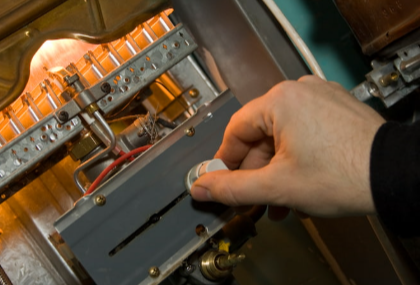Signs Your Heating System Needs Immediate Repair

Your heating system is essential for keeping your home comfortable and safe during colder months. When your system isn’t working properly, it can affect everything from your energy bills to your family’s well-being. While regular maintenance helps prevent many issues, heating systems can still break down or show signs of trouble. Recognizing these signs early can save you from costly repairs or complete system failures. Here are the key indicators that your heating system needs immediate attention.
1. Unusual Noises Coming from the System
Heating systems are designed to operate quietly, aside from the faint hum or occasional click when they turn on or off. If you start hearing banging, rattling, screeching, or grinding sounds, it could mean a serious problem. These noises may be caused by:
- Loose or damaged parts: Such as belts, bearings, or motor components.
- Airflow issues: Duct obstructions or blower problems.
- Ignition or burner malfunctions: Particularly with gas systems.
Ignoring these noises can result in further damage to your system, so it’s essential to call a professional when you hear them.
2. Uneven Heating or Cold Spots in Your Home
A properly functioning heating system should distribute warm air evenly throughout your home. If some rooms feel colder than others, or if you’re noticing drafts in areas that were previously warm, it’s a clear sign of trouble. This issue might be caused by:
- Leaking or blocked ductwork.
- A malfunctioning thermostat.
- A system that is too old or improperly sized for your home.
Fixing this promptly ensures your system works efficiently and prevents additional strain on its components.
3. Frequent Cycling
Your heating system should follow a regular cycle of turning on, heating your home, and shutting off. If it’s cycling on and off too frequently, this is often referred to as “short cycling.” Possible causes include:
- A clogged air filter restricts airflow.
- A malfunctioning thermostat sends incorrect signals.
- An overheating system shuts down to protect itself.
Short cycling wastes energy, reduces your system’s lifespan and may lead to sudden breakdowns.
4. Spike in Energy Bills
An unexplained increase in your energy bills is another major sign of heating system issues. When your heater isn’t running efficiently, it uses more energy to maintain the desired temperature. Common reasons include:
- A dirty air filter restricts airflow.
- Worn-out parts cause the system to work harder.
- Leaks in ductwork lead to heat loss.
According to the U.S. Department of Energy, heating and cooling account for about 50% of a household’s energy use. If your bills suddenly jump, it’s time to investigate your heating system.
5. Constant Need for Repairs
If you find yourself calling a technician more often than usual, your heating system may be nearing the end of its lifespan. Frequent repairs indicate that multiple components are wearing out or failing. The costs of repeated fixes can quickly add up, making it more cost-effective to consider replacing the system.
6. Inconsistent Thermostat Performance
Your thermostat acts as the brain of your heating system. If it’s not working properly, your heater can’t regulate the temperature effectively. Signs of a faulty thermostat include:
- Temperature readings that don’t match the room’s actual feel.
- The system does not respond when you adjust the temperature.
- The heater runs longer or shorter than it should.
A malfunctioning thermostat might need recalibration or replacement, and addressing this quickly can restore your system’s efficiency.
7. Unusual or Burning Smells
It’s normal for a heating system to emit a slight odor the first time you turn it on after months of disuse. This usually happens because dust burns off the components. However, persistent or strong smells, especially burning, metallic, or rotten egg odors, are serious concerns.
- A burning smell could indicate overheating components or electrical issues.
- A metallic smell might mean the motor or other parts are wearing out.
- A rotten egg smell is a sign of a gas leak, which requires immediate attention for safety.
Turn off your system and contact a professional if you notice any of these odors.
8. Weak or No Airflow
When the air coming from your vents is weak or nonexistent, it’s a sign that your heating system isn’t working as it should. Causes include:
- Clogged filters reduce airflow.
- A failing blower motor that can’t circulate air properly.
- Blocked or leaking ductwork.
Without proper airflow, your heater can’t distribute warm air effectively, leaving your home uncomfortable and the system under stress.
9. The Pilot Light is Yellow or Flickering
For systems with a pilot light, the flame should be blue. A yellow or flickering flame could indicate a ventilation issue, such as a problem with the heat exchanger. This could lead to carbon monoxide buildup, which is hazardous.
Carbon monoxide is odorless and invisible but dangerous. Common symptoms of carbon monoxide exposure include headaches, dizziness, nausea, and confusion. Install carbon monoxide detectors and take immediate action if your pilot light isn’t blue.
Read more: The Benefits of Earning Your Master’s in Sports Administration Online vs. On-Campus
10. System Fails to Turn On or Stay On
If your heating system struggles to start or frequently shuts off, it’s a clear sign of trouble. Common reasons for this include:
- Electrical issues with the power supply or wiring.
- A damaged thermostat.
- Overheating due to restricted airflow or dirty components.
A system that fails to operate reliably will leave you without heat when you need it most.
Preventing Heating System Failures
While recognizing the signs of a failing system is essential, prevention is always better than repair. Regular maintenance can help you avoid many of these problems. Key maintenance tasks include:
- Changing air filters every 1–3 months.
- Scheduling professional inspections annually.
- Keeping vents and ducts clean and unobstructed.
- Checking for signs of wear and tear on visible components.
The Risks of Ignoring the Signs
Delaying repairs for a malfunctioning heating system can have serious consequences, including:
- Higher Energy Costs: Inefficient systems consume more energy.
- Health Risks: Poor air quality and potential carbon monoxide leaks.
- Complete System Failure: Neglected problems can lead to a total breakdown, requiring expensive replacements.
When to Seek Professional Help
It’s always better to address heating system issues early. If you notice any of the signs mentioned, contact a qualified technician for a thorough inspection. Early intervention ensures your home remains safe, comfortable, and energy-efficient throughout the colder months.




